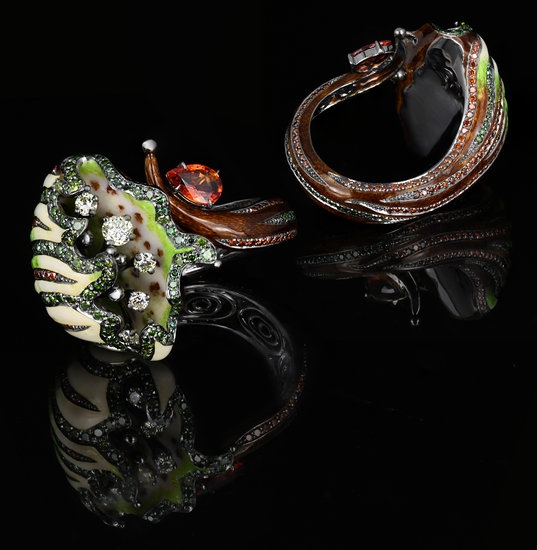Keeping your jewelry clean is not only necessary for maintaining its beauty but also for preserving its quality and longevity. Over time, dirt, oils, and debris can accumulate on your jewelry, causing it to lose its luster and shine. Improper cleaning methods can even damage delicate gemstones or weaken metal settings. That’s why it’s crucial to understand the importance of proper jewelry cleaning and to know how to make your own jewelry cleaner.
Dirty jewelry not only looks dull and unattractive but can also harbor bacteria and allergens, posing health risks. Regular cleaning is essential for removing these contaminants that may come into contact with your skin. Additionally, accumulated dirt and grime can scratch the surface of your gemstones or wear away at the metal over time. By neglecting cleaning, you risk compromising the overall appearance and structural integrity of your precious pieces.
When it comes to jewelry cleaners available in the market, many products claim to restore shine and remove tarnish effectively. However, some commercial cleaners may contain harsh chemicals that can not only damage your jewelry but also harm your health.
That’s why exploring natural and homemade solutions for jewelry cleaning is becoming increasingly popular. In this article, we will delve into both commercial and DIY options so that you can make an informed decision about how best to care for your jewelry collection.
The Hazards of Dirty Jewelry
Dirty jewelry not only looks dull and unattractive, but it can also pose several hazards. Regular cleaning of jewelry is essential to maintain its appearance, prevent damage, and ensure that it is safe to wear. This section will discuss the hazards of dirty jewelry and highlight the importance of regular cleaning.
One of the main hazards of dirty jewelry is the buildup of dirt, oils, and other substances. When we wear jewelry, it can come into contact with various materials such as sweat, lotions, cosmetics, and even environmental pollutants. Over time, these substances can accumulate on the surface of the jewelry, making it appear dull and faded. Additionally, this buildup can attract bacteria and germs, which can lead to skin irritations or infections.
Another hazard is the potential damage that can occur to jewelry due to dirt and debris. Small particles of dirt or sand can get trapped in crevices or settings of gemstones, causing scratches or abrasions. If left uncleaned for a long time, these scratches can become more visible and may require professional repair. Moreover, certain substances like hairspray or perfume can corrode metal components over time if not cleaned off properly.
Furthermore, dirty jewelry increases the risk of losing stones or parts. A piece of jewelry that hasn’t been cleaned regularly may have loose prongs or clasps that go unnoticed. When subjected to everyday activities like reaching into pockets or brushing against surfaces, stones may dislodge from their settings without warning. By regularly cleaning your jewelry and inspecting for any loose parts, you can prevent potential loss.
Regular cleaning of jewelry helps to eliminate these hazards by removing dirt build-up, preventing damage caused by debris particles and corrosive substances, as well as minimizing the risk of stone loss. In the following sections of this article, we will explore different methods for cleaning your jewelry using both commercial cleaners and natural homemade solutions.
| Hazard | Consequence |
|---|---|
| Buildup of dirt and oils | Dull appearance, attraction of bacteria and germs |
| Potential damage | Scratches, abrasions, corrosion of metal components |
| Risk of stone loss | Loose stones or parts go unnoticed, increasing chance of loss when worn |
Section
The Pros and Cons of Commercial Jewelry Cleaners
Commercial jewelry cleaners are widely available in the market and many people rely on them for keeping their jewelry clean and sparkling. These cleaners come in various forms such as liquid solutions, pre-moistened wipes, and sonic cleaning machines. While they can be convenient to use, it is important to understand their effectiveness and potential drawbacks.
Effectiveness of Commercial Jewelry Cleaners
One of the advantages of using commercial jewelry cleaners is that they are specifically formulated for cleaning jewelry, which means they can remove dirt, grease, and tarnish effectively. These cleaners often contain chemicals that can dissolve tough stains and restore the shine of your jewelry. They are also easy to use as most come with instructions that guide you through the cleaning process.
However, it is worth noting that not all commercial jewelry cleaners are created equal. Some may be more effective than others depending on the type of jewelry or the specific cleaning needs you have. Additionally, certain commercial cleaners may not be suitable for delicate gemstones or antique pieces, as they could potentially cause damage or discoloration.
Potential Drawbacks of Commercial Jewelry Cleaners
While commercial jewelry cleaners can be effective, they do have some potential drawbacks to consider. First, many commercial products contain harsh chemicals such as ammonia or acids that could be harmful if not used properly or with sufficient ventilation. It is important to read the labels carefully and follow the instructions provided by the manufacturer to avoid any adverse reactions or damage to your jewelry.
Furthermore, frequent use of commercial jewelry cleaners may contribute to a build-up of residue on your jewelry over time. This residue can dull the shine and make your jewelry look less attractive. Additionally, some people may find that certain commercial cleaners cause skin irritations or allergies due to their chemical ingredients.
DIY Jewelry Cleaning
When it comes to cleaning your jewelry, there are plenty of options available in the market. However, many people prefer to use natural and homemade solutions for a variety of reasons. Not only are these solutions often more affordable, but they also give you control over the ingredients that come into contact with your precious pieces. In this section, we will explore some popular natural and homemade solutions for cleaning jewelry.
One popular natural solution for cleaning jewelry is using a mixture of baking soda and water. Baking soda is known for its mild abrasive properties, making it ideal for removing dirt and grime from jewelry. To use this method, simply create a paste by mixing baking soda with water until it forms a thick consistency. Then, gently rub the paste onto your jewelry using a soft cloth or toothbrush. Rinse with water and dry thoroughly to reveal the sparkling results.
Another common homemade solution involves using vinegar and dish soap. Vinegar is known for its acidic properties, which can help dissolve stubborn stains on jewelry. To make this solution, combine equal parts white vinegar and warm water in a bowl or container.
Add a few drops of dish soap and mix well. Place your jewelry into the solution and let it soak for about 15-20 minutes. Remove the jewelry, scrub gently with a soft brush if needed, rinse with water, and dry thoroughly.
If you’re looking to clean silver jewelry specifically, you can try using lemon juice as a natural cleanser. The citric acid in lemon juice helps remove tarnish from silver items. Simply squeeze fresh lemon juice into a container and add hot water in equal parts. Let your silver jewelry soak in this solution for around 5-10 minutes before rinsing off with water and drying thoroughly.
Using natural and homemade solutions not only helps maintain the shine of your jewelry but also minimizes exposure to harsh chemicals that may be present in commercial cleaners. Experimenting with different recipes can also be a fun and creative way to find the best method for cleaning your specific pieces.
Homemade Jewelry Cleaner Recipes
Homemade jewelry cleaners are a popular alternative to commercial cleaners for many reasons. Not only are they generally more affordable, but they often use simple, natural ingredients that are readily available in most households. By making your own jewelry cleaner, you can have sparkling results without the worry of harsh chemicals or expensive products.
One common homemade jewelry cleaner recipe involves using a mixture of mild dish soap and warm water. This gentle solution is effective for removing dirt and grime from most types of jewelry, including gold, silver, diamonds, and gemstones. To make this cleaner, simply fill a small bowl with warm water and add a few drops of mild dish soap.
Gently stir the mixture to combine the soap and water. Then, soak your jewelry in the solution for a few minutes before using a soft-bristled brush to gently scrub away any residue. Rinse the jewelry thoroughly with clean water and pat it dry with a soft cloth.
Another effective homemade jewelry cleaner recipe is made with equal parts vinegar and water. Vinegar’s acidic properties help dissolve stubborn tarnish on silver and brass jewelry. To create this solution, mix equal parts white vinegar and distilled water in a container. Place your tarnished jewelry into the solution and let it soak for 10-15 minutes.
You may notice bubbles forming as the vinegar reacts with the tarnish. After soaking, remove the jewelry from the solution and gently scrub it with a soft brush or toothbrush to remove any remaining tarnish. Rinse thoroughly with clean water and dry with a soft cloth.
In addition to these homemade recipes, there are many other variations using ingredients like baking soda, lemon juice, salt or hydrogen peroxide that can be found easily at home or purchased inexpensively at local stores. The key is to find recipes that are safe for your specific type of jewelry while effectively cleaning away dirt and grime.
By creating your own homemade jewelry cleaner using simple ingredients found in your pantry, you can achieve sparkling results without the need for expensive commercial cleaners. Whether you’re cleaning gold, silver, diamonds, or gemstones, there are numerous recipes available to suit your needs. Give these homemade solutions a try and enjoy the gleaming beauty of your jewelry.
Section
Making your own jewelry cleaner can be an easy and cost-effective way to keep your precious pieces sparkling and beautiful. With a few simple ingredients, you can create a homemade solution that is gentle yet effective in removing dirt, grime, and tarnish from your jewelry. In this section, we will provide you with a step-by-step guide on how to make your own jewelry cleaner.
Gather the Ingredients
The first step in making your own jewelry cleaner is to gather the necessary ingredients. One of the most common and effective homemade jewelry cleaner recipes includes ingredients such as dish soap, water, baking soda, and ammonia. These ingredients are readily available in most households or can be easily purchased at any grocery store.
Mixing the Solution
Once you have gathered all the ingredients, it’s time to mix them together to create your homemade jewelry cleaner. Start by filling a bowl or sink with warm water. Add a few drops of dish soap along with a teaspoon of baking soda and a small capful of ammonia. Stir the mixture gently until all the ingredients are well combined.
Cleaning Your Jewelry
With your homemade jewelry cleaner prepared, you are ready to start cleaning your precious pieces. Begin by placing your jewelry into the solution and allowing it to soak for about 10-15 minutes. This will help loosen any dirt or grime on the surface of your jewelry.
After soaking, use a soft-bristle toothbrush or a clean cloth to gently scrub away any remaining dirt or tarnish from your jewelry. Be sure to pay attention to hard-to-reach areas such as crevices or prongs where dirt can accumulate.
Once you have finished cleaning your jewelry, rinse it thoroughly under warm water to remove any residue from the cleaning solution. Pat dry with a clean towel and allow it to air dry completely before wearing or storing.
Making your own jewelry cleaner is not only a cost-effective solution but also a great way to ensure that your precious pieces are cleaned properly and safely. By following this step-by-step guide, you can keep your jewelry looking its best for years to come.
Tips for Cleaning Different Types of Jewelry
Cleaning different types of jewelry requires different techniques and care. Each type of jewelry has its own specific properties and vulnerabilities that must be considered when cleaning. Here are some tips for cleaning gold, silver, diamonds, and gemstones to help you keep your jewelry looking its best.
When it comes to cleaning gold jewelry, it is important to avoid using harsh chemicals or abrasive materials that can damage the metal. Instead, opt for a mild detergent or dish soap mixed with warm water. Soak the gold jewelry in the soapy water for a few minutes to loosen any dirt or grime, then gently scrub it with a soft-bristled toothbrush.
Pay extra attention to any intricate details or gemstone settings. Rinse the jewelry thoroughly with warm water and pat dry with a soft cloth. Avoid using paper towels as they can scratch the surface of the gold.
When cleaning silver jewelry, it is essential to be cautious as silver is a delicate metal that can tarnish easily. To remove tarnish, create a paste by mixing baking soda with water until it forms a thick consistency. Apply the paste onto the silver jewelry using a soft cloth or sponge and gently rub in circular motions.
Rinse off the paste with warm water and pat dry with a clean cloth. If your silver jewelry has gemstones or pearls, avoid getting them wet as excessive moisture can cause damage.
Diamonds are known for their brilliance and sparkle, but they can become dull over time due to oils, lotions, and everyday dirt buildup. To clean diamond jewelry at home, create a solution of equal parts ammonia and water in a small bowl. Soak the diamond jewelry in this solution for about 20-30 minutes to dissolve any grime that may have accumulated on the stone’s surface.
After soaking, gently scrub the diamond with a soft toothbrush to remove any remaining dirt particles. Rinse thoroughly under warm running water to ensure all traces of ammonia are removed and then pat dry with a soft cloth.
When it comes to cleaning gemstone jewelry, it is important to be aware of the specific properties of the gemstone you are dealing with. Some gemstones may be more sensitive to certain chemicals or solutions. In general, a mild detergent or dish soap mixed with warm water should be safe for most gemstones. However, it is always recommended to check with a jeweler or do some research on the specific gemstone before attempting any cleaning methods.
By following these tips and being aware of the unique characteristics of each type of jewelry, you can ensure that your gold, silver, diamonds, and gemstones stay clean, shiny, and beautiful for years to come.
Bonus Tips
Delicate and antique jewelry requires special care when it comes to cleaning. These pieces often have intricate details, fragile materials, and may be more susceptible to damage from harsh chemicals or rough handling. To ensure their longevity and beauty, here are some bonus tips for safely cleaning delicate and antique jewelry.
Firstly, it is important to note that delicate and antique jewelry should be handled with extra caution. Avoid excessive pulling or tugging on chains or settings as this can cause damage or loosening of stones. Additionally, be mindful of any loose or weak clasps or prongs that could potentially break during the cleaning process.
When selecting a cleaning method for delicate and antique jewelry, it is best to choose gentle and non-abrasive options. One popular method involves creating a paste using baking soda mixed with water. This paste can be applied onto the jewelry with a soft toothbrush or cloth, gently scrubbing away dirt and grime. It is important to rinse the jewelry thoroughly afterwards with lukewarm water to remove any residue.
For gemstone jewelry such as emeralds, opals, pearls, or coral, it is advisable to avoid immersing them in water as it can cause damage. Instead, use a soft cloth dampened with a mild soap solution to gently clean these pieces. Be sure to pat them dry immediately after cleaning.
When dealing with very old or antique jewelry that may have accumulated dirt over time in hard-to-reach crevices or settings, consider using a professional jeweler’s ultrasonic cleaner instead. These machines use high-frequency sound waves to create tiny bubbles that will loosen dirt and debris without causing harm to fragile pieces.
By following these bonus tips for cleaning delicate and antique jewelry safely, you can ensure that your precious heirlooms retain their beauty while being properly maintained. Taking the time and care to maintain these pieces will not only preserve their value but also allow you to enjoy wearing them for many generations to come.
Conclusion
One of the main advantages of using homemade jewelry cleaners is that you have control over the ingredients used. Many commercial jewelry cleaners contain harsh chemicals such as ammonia or vinegar, which may cause damage to certain types of gemstones or metals. With homemade cleaners, you can tailor the ingredients to suit the specific needs of your jewelry, ensuring that it remains in pristine condition.
Additionally, homemade cleaners are often just as effective as their commercial counterparts. Ingredients such as baking soda, dish soap, and hydrogen peroxide have proven to be powerful cleaning agents for a wide range of jewelry materials. These ingredients have properties that help remove dirt, oil, and tarnish from your jewelry while being gentle enough not to cause any harm.
To ensure successful results when using homemade jewelry cleaners, it is important to follow proper cleaning techniques and guidelines. This includes using appropriate brushes or soft cloths for scrubbing and polishing, avoiding abrasive materials that could scratch delicate surfaces, and rinsing thoroughly after cleaning to remove any residual cleaner.
By incorporating these recommendations into your jewelry cleaning routine, you can keep your favorite pieces sparkling and beautiful for years to come. Remember to always refer to reliable resources and use quality tools when making your own jewelry cleaner. Taking proper care of your jewelry will not only enhance its appearance but also prolong its lifespan.
Resources and Recommendations
Conclusion:
In conclusion, making your own jewelry cleaner can be a cost-effective and efficient way to keep your jewelry gleaming and beautiful. By utilizing simple ingredients that can be found in your pantry or easily purchased, you can create homemade solutions that are both effective and gentle on your precious pieces.
It is important to note that not all commercial jewelry cleaners are created equal. While some may provide satisfactory results, others may contain harsh chemicals that can damage certain types of jewelry. By using homemade cleaners, you have more control over the ingredients used and can tailor the solution to meet the specific needs of your jewelry.
Remember to always take into consideration the type of jewelry you are cleaning and follow any specific instructions for each piece. Different materials such as gold, silver, diamonds, and gemstones may require different cleaning methods. Additionally, delicate and antique jewelry must be handled with extra care to avoid causing any damage.
Lastly, when it comes to finding the necessary supplies and tools for cleaning your jewelry, there are various resources and recommendations available. Local craft stores often carry a selection of jewelry cleaning supplies including brushes, cloths, and polishing compounds. Online retailers also offer a wide range of options with detailed descriptions and customer reviews to help you make informed choices.
By following these tips and utilizing homemade jewelry cleaner recipes, you can ensure that your precious pieces stay sparkling and beautiful for years to come. With proper care and regular cleaning, you can enjoy wearing your favorite jewelry without worrying about dirt buildup or dullness. So go ahead and invest a little time in creating your own homemade cleaner – your jewelry will thank you.
Frequently Asked Questions
What can I use for a jewelry cleaner at home?
For a jewelry cleaner at home, there are a few options you can consider. One popular homemade solution is using a mix of warm water and mild dish soap. This gentle combination can effectively remove dirt and grime from your jewelry.
Another option is vinegar, which can be mixed with warm water to create a cleaning solution. However, it’s important to note that vinegar should not be used on certain gemstones or delicate jewelry pieces, as it may cause damage or discoloration. Lastly, if you have access to a toothbrush with soft bristles, you can use it along with warm water and mild soap to gently scrub your jewelry clean.
What is the main ingredient in jewelry cleaner?
The main ingredient in many commercial jewelry cleaners is ammonia. Ammonia is known for its ability to dissolve grease and oils, making it an effective cleaner for removing the buildup that accumulates on jewelry over time.
It works particularly well on metals like gold and silver, but it’s important to note that ammonia is not suitable for all types of gemstones or delicate pieces of jewelry. When using any jewelry cleaner containing ammonia, always follow the instructions provided and exercise caution to prevent any potential damage.
How do you make homemade jewelry cleaner with Dawn?
To make homemade jewelry cleaner with Dawn dish soap, you will need a few simple ingredients. Start by filling a bowl or sink with warm water – avoid hot water as it may damage certain gemstones or materials. Add just a few drops of Dawn dish soap into the water, ensuring it’s fully mixed in without creating excessive suds.
Place your jewelry items in the soapy solution and let them soak for about 15-20 minutes. If there are stubborn areas that require extra attention, you can lightly scrub them using a soft-bristled toothbrush before rinsing thoroughly with clean water. Finally, pat your jewelry dry with a soft cloth or leave them on absorbent paper towels until completely dry before storing them away.

Welcome to my jewelry blog! My name is Sarah and I am the owner of this blog.
I love making jewelry and sharing my creations with others.
So whether you’re someone who loves wearing jewelry yourself or simply enjoys learning about it, be sure to check out my blog for insightful posts on everything related to this exciting topic!





